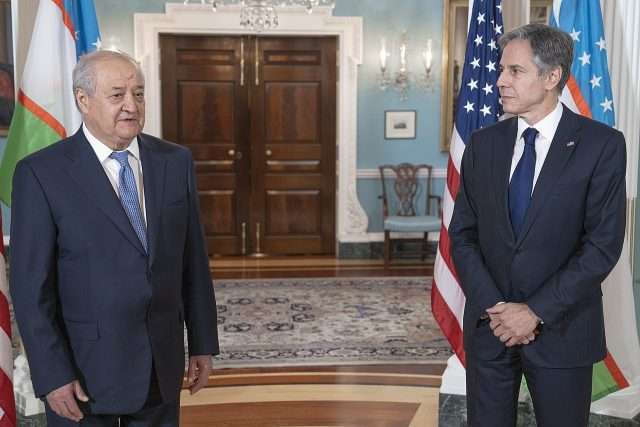
Geopolitical Report 2785-2598 Volume 13 Issue 2
Author: Giuliano Bifolchi
Thanks to the support of the American-Uzbek Chamber of Commerce, the United States aims at strengthening its economic presence in Uzbekistan, considering the strategic role that Tashkent plays in Central Asian dynamics and transport corridors and Afghan domestic politics.
On October 27th, 2021, the First Deputy Chairman of the Senate of the Oliy Majilis, Sodik Safoev, held a meeting with the head of the American-Uzbek Chamber of Commerce, Carolyn Lamm, who arrived in Uzbekistan shortly before as an international observer in the presidential elections.
During the meeting, Carolyn Lamm noted the high level of organisation and conduct of the presidential elections, stressing that the 2021 election campaign and the elections themselves were much more transparent and open than the previous ones, which she could also observe in the past. Carolyn Lamm highlighted the high turnout among young voters.
Further, the parties exchanged views on cooperation issues between Uzbekistan and the United States in trade, economic and educational spheres. According to the American-Uzbek Chamber of Commerce chairman, the reforms carried out in Uzbekistan in the past five years in the business sphere and foreign policy have significantly contributed to an increase in interest in Uzbekistan from foreign business circles and increased the level of confidence in the country.
Geopolitical scenario
Shavkat Mirziyoyev won the recent presidential elections in Uzbekistan, confirming its leadership. Mirziyoyev’s reelection highlights political stability in the country and the possibility for the Uzbek Government to continue democratic and economic reforms to reach international standards and attract more foreign direct investments (FDIs) necessary to support Uzbek economic diversification and national infrastructural projects. Even though the country is still far from international standards regarding economic freedom as the Heritage Foundation 2021 Index of Economic Freedom highlighted, Uzbekistan attracted 6.6 billion dollars FDIs in 2020.
Since the U.S. troops withdrew from Afghanistan, Uzbekistan has played a pivotal role in Central Asian security, considering that Tashkent is actively involved in strengthening regional stability and guaranteeing border control to avoid from the Afghan territory any terrorist group might export its activity and propaganda in Central Asia and entire Eurasia.
Uzbekistan soon established a dialogue with the Taliban to discuss economic cooperation, transport corridors, and security problems (Uzbekistan and the Taliban discussed joint projects). Furthermore, Tashkent enhanced collaboration with Ashgabat to create a collaborative partnership in connection with the recent developments in Afghanistan to secure Uzbek and Turkmen’s borders and boost their economies (How Afghanistan is influencing the Turkmenistan-Uzbekistan cooperation). Indeed, Uzbekistan seeks to stabilise the Afghan State as one of its primary goals in the region, considering the influence that the Taliban or the rise of several terrorist groups might have on Uzbek security and stability (i.e. the Islamic Movement of Uzbekistan).
Why does this matter?
Washington’s decision to withdraw from Afghanistan did not mean the U.S. complete abandonment of Central Asia. This region still has a considerable influence and importance on the Eurasian chessboard, and it is currently the ‘battleground’ among different international and regional actors. In this regard, the White House might play the card of economic partnership and financial support in those target countries considered fundamental to contrast the rise of Beijing’s Belt and Road Initiative and the affirmation of Moscow’s Eurasian Economic Union.
Due to its geographical position in the middle of Central Asia and thanks to its political stability represented by Mirziyoyev’s reelection, Uzbekistan might become an essential asset in Washington’s Central Asian strategy. Hence, U.S. investments in the Uzbek market might fortify Washington’s position, contrast Chinese and Russian presence, and guarantee a decisive interlocutor in the Afghan scenario.
In the future, if Washington will accomplish the mission of strengthening its position and image in Uzbekistan, and considering that Tashkent is far less dependent on Moscow and Beijing than other Central Asian republics, it is not currently part of the Collective Security Treaty Organisation. It does not have any foreign military bases on its territory, the United States might promote military cooperation and the eventuality to establish a military base on the Uzbek soil again to contrast any threats from Afghanistan in case the Taliban will fail to stabilise the situation or civil war will break out.



